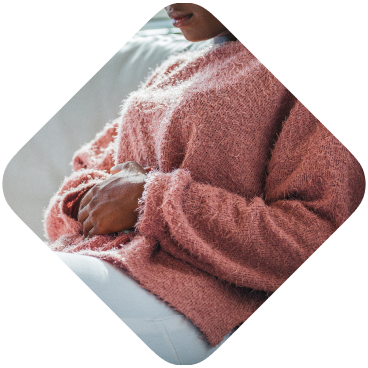Fortunately, there are several things you can do to help ease the symptoms of bloating when they first appear – from watching what you eat to using certain over-the-counter medicines.
In this guide, we’ll help you understand more about bloating, explain what it’s caused by and discuss how it can be treated.
WHAT IS BLOATING?
Bloating is an uncomfortable sensation of fullness, which many people say feels like pressure or tension in the belly (abdomen). It can also be accompanied by what’s known as distension, which refers to a widening of the waist.
Bloating is very common. In fact, 40% of the general population is estimated to experience occasional bloating symptoms, although they are slightly more common in women. Research is limited but factors like menstruation and hormonal effects are thought to be largely responsible.
Bloating also particularly affects people with a condition called irritable bowel syndrome (IBS), with 90% of IBS sufferers experiencing bloating symptoms. But, there are other reasons why it can develop as well.

WHAT DOES BLOATING FEEL LIKE?
When you are bloated, it may feel like your belly is full and tight, as if there’s gas trapped inside. This is what’s referred to as trapped wind (gas) – a completely normal by-product of the digestive process that occurs when the bacteria in the gut break down the food we eat.
Bloating might also make your abdomen look bigger than it usually is. Some other symptoms often associated with bloating can include:
- Passing wind more than usual
- Abdominal pain or discomfort
- Your stomach rumbling or making noises
If you experience symptoms such as severe abdominal pain, blood in your stools, diarrhoea, vomiting, weight loss or persistent bloating, speak to your doctor as soon as possible.
WHAT CAUSES BLOATING?
While the mechanisms that result in bloating and distension are complex and not fully understood, it’s thought to be brought on by a number of reasons.
The most common cause is having a lot of gas in your gut, which can result from consuming certain foods and drinks or swallowing air when you eat.
However, bloating can also be brought on due to factors such as:
- Gaining weight
- Overeating
- Constipation
- Getting your period
- Food intolerances (such as lactose)
- Not being able to release gas properly
Bloating is also a symptom of various medical conditions, so you may experience it if you have been diagnosed with any of the following:
- IBS
- Gastro-oesophageal reflux disease (GERD/GORD)
- Coeliac disease
- Crohn’s disease
- Colitis
- Dumping syndrome
- Ovarian cancer
- Pancreatic insufficiency
It’s important to speak to your local pharmacist or doctor about any symptoms you’re experiencing. Once they know about the medications you may take or any existing medical conditions, they’ll be able to recommend the most appropriate course of action.
For any treatments your pharmacist or doctor does recommend, you should thoroughly read through the patient information leaflet that comes with it.
HOW TO REDUCE BLOATING
Feeling bloated can be uncomfortable. Fortunately, there are several things you can do to not only help relieve the symptoms of bloating when they first appear but also help prevent them in the future.
BLOATING PREVENTION TECHNIQUES
Since bloating can be triggered by certain foods, changing your diet and the way you eat your meals is often a good place to start.
THINK ABOUT WHAT YOU EAT
There are several types of foods and drinks you should try to cut down on to reduce symptoms of bloating. This includes things like:
- Chewing gum
- Fizzy drinks
- Foods high in fructose or sorbitol
- Monosodium glutamate (MSG) often found in Chinese food
- Alcohol
- Caffeine
- Fruits (such as apples, prunes and raisins) and vegetables (such as broccoli, lentils, and onions)
- Processed, sugary, spicy or fatty foods
On the other hand, eating foods that are high in fibre, such as oats, can be helpful if your bloating is brought on by constipation.
THINK ABOUT HOW YOU EAT
Here’s what you should do when eating or drinking to help prevent bloating:
- Chew with your mouth closed to avoid swallowing air
- Avoid eating too quickly
- Drink plenty of water
- Pace your meals throughout the day
- Don’t eat large meals late at night before bed
- Don’t slouch while you’re eating
- Avoid eating fruit straight after a meal
- Avoid eating any foods you know you’re intolerant to (such as milk if you’re lactose intolerant)
CHANGE UP YOUR LIFESTYLE
While it may be the last thing you feel like doing, getting enough regular exercise has also been shown to improve your digestion and prevent bloating.
TREATMENTS TO RELIEVE BLOATING
There are a wide variety of over-the-counter medicines available to help ease symptoms of bloating when they start to appear.
Rennie® Deflatine, for example, is a discreet and effective treatment with active ingredients to help relieve the potentially embarrassing symptoms of trapped wind, such as uncomfortable bloating and flatulence.
Known as simethicone, this works by gently dispersing bubbles of gas to help reduce the frequency and severity of gas, distension and bloating.
Additionally, Rennie® Deflatine’s formula contains calcium carbonate and magnesium carbonate. The antacid properties of these ingredients can help to neutralise excess stomach acid and offer effective relief from symptoms of heartburn and indigestion.
It’s important to note that every case of bloating is different, so the best form of treatment for you will depend on what’s causing you to feel bloated.
It’s often good to speak to your doctor or local pharmacist for advice. They may need to refer you to a specialist if over-the-counter medicines or dietary and lifestyle changes haven’t made a difference.
You should also seek advice from your doctor if you find that you’ve been bloated for three weeks or more, you feel bloated on a regular basis (more than 12 times a month) or you find it difficult to perform daily activities because of it.
Looking for more information on what you can do to beat the bloat? Take a look at our dedicated article with various stomach bloating remedies you can easily do at home.





